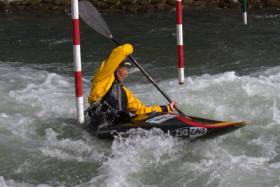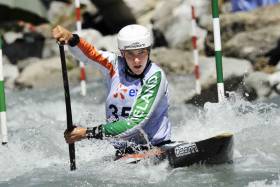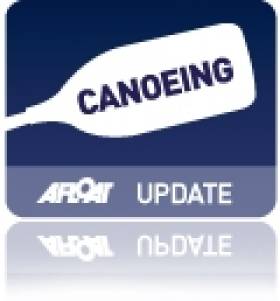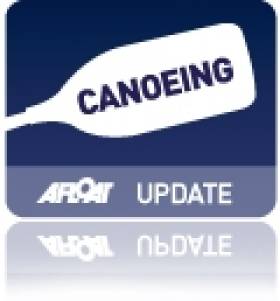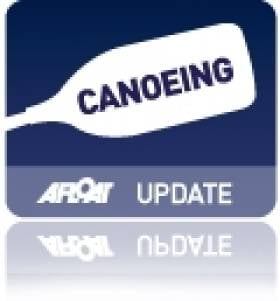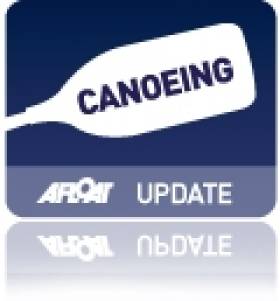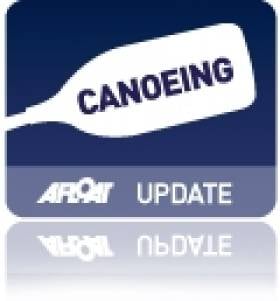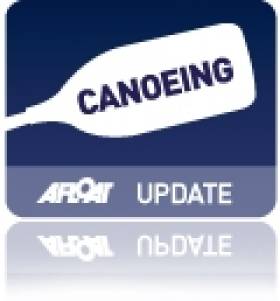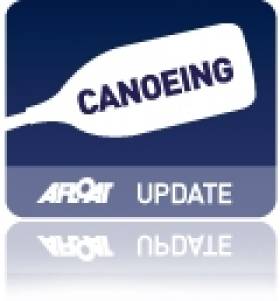Displaying items by tag: Hannah Craig
No Joy for Craig at European Championships
#Canoeing: Hannah Craig’s chances of Olympic qualification disappeared as the K1 competitor failed to make the semi-finals of the canoe slalom European Championships in Slovakia. The Antrim woman, who had finished 10th in London in 2012, negotiated the course in 111.59 seconds, including four seconds of penalties, in the first run. This placed her 28th. Her second run gave her another chance, but she missed the final two gates, incurring 100 seconds in penalties, and missed out.
Ireland International Places on the Line at Lucan
#Canoeing: The top Irish competitors in canoe slalom will be in action at the Irish Championships at the Sluice Weir in Lucan this Saturday and Sunday, March 5th and 6th. The races at the redeveloped Sluice Weir in the Lucan Demesne/St Catherine’s Park, will double as selection races for the Ireland senior and junior international teams for:
- The Senior European Championships in Liptovsky Mikulas, (Slovakia) in May.
- The five-event World Cup series in Ivrea (Italy), La Seu d’Urgell (Spain) and Pau (France) in June and in Prague (Czech Republic) and Tacen (Slovenia) in August.
- Junior and Under 23 World Championships in Krakow (Poland) in July and European Championships in Solkan (Slovenia) at the end of August.
The Senior European Championships in Liptovsky Mikulas will also count as the final qualification event for places at the Olympic Games. Only one place is available in each class to European countries who have not yet qualified.
Racing on both days will feature London 2012 K1 finalist Hannah Craig, who is entering her second season back to competition following the birth of her son Arlo in May 2014. Hannah has spent the winter at the artificial whitewater course in Nottingham, England in preparation for the 2016 season.
Competing in the C1 category will be Liam Jegou who took 6th place in the Under 23 European Championships in Krakow last year and got semi-final placings in two of his three World Cup races and in the World Championships in his first season of senior races. He has just completed a winter-training bloc on the artificial whitewater course in Al Ain, Dubai.
Robert Hendrick will double-up with his brother Noel in the Under 23 C2 class over the weekend, having taken 4th place in the Junior World Championships in Brazil last year.
In the K1M class, Ciarán Heurteau is coming back to Ireland from a two-month intensive winter training bloc in New Zealand to compete for a place at the European Champs and Olympic qualifier after being out of competition last season due to an anterior cruciate ligament injury which required surgery and rehabilitation.
To provide a good benchmark to assess selection performance levels, Canoe Slalom Ireland are bringing in Mike Kurt (30th in men’s kayak world rankings and semi-finalist in the 2015 World Championships) from Switzerland. The Welsh junior and under-23 team will also take part.
Craig One Touch From Semi-Final at World Championships
#Canoeing: Ireland’s Hannah Craig came close, but missed out on qualifying for the semi-finals of the women’s K1 at the canoe slalom World Championships in Lee Valley in England today. She came down the course in 97.04 seconds on her first run, but a touch on gate 11 took her to 99.04 seconds, and pushed her out of the top 20, who qualified. The second run had just 10 qualifying places available. Craig finished 21st, with a penalty-free run of 100.4 seconds.
Canoe Slalom World Championships, Lee Valley, London, Day One (Irish interest)
Women
K1 – First Run (20 qualify): 30 H Craig 99.04 seconds (incl 2-sec penalty); 2nd Run (10 qualify): 21 H Craig 100.4 sec.
Craig's Hopes End in K1 Canoe Slalom Final
#canoe – Antrim woman Hannah Craig's hopes of a medal in the K1 slalom canoe final ended this afternoon when she hit three gates on the way down in her bid for glory.
Craig was first into the water in the final but hitting gates five, nine and 16 cost her a six-second penalty and she finished with a time of 127.36 well outside of the medal times.
#CANOEING - The Irish Times profiles Irish canoeing contender Ciaran Heurteau ahead of the European Championships in Germany this weekend, where he hopes to claim his place at the 2012 Olympics.
Born in Paris to a Northern Irish mother, Heurteau has competed for Ireland since 2006, and is back to fighting fitness following a shoulder injury last year and a lacklustre World Championships performance in September.
“Looking at how I am coming into this race and how I came into the race at the Worlds, it’s a different feeling," he says. "I have never come into a race as prepared as I am now."
Heurteau joins Patrick Hynes and Eoin Rheinisch - who finished fourth in the K1 slalom in Beijing four years ago - among the Irish contingent in Augsburg for the championships, which began yesterday.
Meanwhile, among the women Olympic hopefuls on the team is Northern Ireland's Hannah Craig, who along with Heurteau and others was interviewed by BBC Sport this week.
Olympic Canoe Slalom Qualifying Spots Snapped Up in Lucan
#CANOEING - The Irish Times reports that Eoin Rheinisch and Ciarán Heurteau have secured their canoe slalom qualification spots for London 2012 after last weekend's selection races in Lucan.
Three places were up for grabs in the men's K1, with the third yet to be confirmed after fourth-placed Patrick Hynes contested a touch on a gate by third-place finisher Sam Curtis.
Canoeing Ireland's recently appointed general manager Karl Dunne said the objection is currently being considered.Meanwhile, in the women's K1, the qualifying spots went go Hannah Craig, Helen Barnes and Aisling Conlon.
The qualifiers will be part of the European Championships in Augusburg, Germany from 10-13 May, where Olympic spots are available for boats from two countries not already qualified.
Ireland's Hopefuls Test London Olympics Canoeing Course
Ireland's four Olympic canoeing hopefuls were invited to take part in an Olympic test event to mark one year till the start of next summer's games, The Irish Times reports.
Eoin Rheinisch and Ciarán Heurteau in men’s K1 joined Hannah Craig and Aisling Conlan in women’s K1 to compete in closed-door elimination rounds at Lee Valley Whitewater centre on Thursday.
The event mirrors the format of next year’s Olympic Games, so the field of 52 competitors in the K1 men's competition were set to be reduced to 21 for today's finals.
Rheinisch – who finished fourth in Beijing three year ago – made positive comparisons between the man-made course in north London and the Chinese venue.
Five Represent Ireland at Canoe Slalom World Cup
Eoin Rheinisch joins four others representing Ireland at the Canoe Slalom World Cup today.
Ciarán Heurteau, Patrick Hynes, Hannah Craig and Aisling Conlan round out the squad competing in Leipzig, Germany.
Rheinisch told The Irish Times that he was "shattered" after a week of hard training in Bratislava, aiming for the World Championships and Olympic qualification there in September.
"But they are the kind of sessions I need to be getting intermittently,” he said.
Big Weekend for Ireland's Canoeists in Balkans
Eoin Rheinisch made a good start in the K1 qualification round at the Canoe Slalom World Cup in Slovenia.
The Kildare native - who is recovering from a shoulder operation - finished 10th in the heats, qualifying for yesterday's semi-finals where he finished in 28th place.
The Irish Times reports that he described the performance as encouraging.
“I enjoyed myself today and that was my goal,” he said.
In other action from Slovenia, Hannah Craig failed make the semi-final in the women’s K1, while Patrick Hynes and Ciaran Heurteau missed out in the men’s K1.
Meanwhile in Serbia, Salmon Leap's Jenny Egan set a new Irish women's record of 1m 55.9 sec in the 500m semis at the European Sprint Canoe Championships in Belgrade, the Evening Herald reports.
She went on to finish ninth in both the 5,000m final annd 200m B final.
Fellow Salmon Leap member Barry Watkins placed fourth in the 500m B final and eighth in the 1,000m B final.
Skills Tested on New Lagan Canoe Slalom
The BBC News website has video of a new Olympic-style slalom course on the River Lagan for canoeists to test their skills.
The professional facility was constructed at Shaws Bridge by local enthusiasts who have been training on the Lagan for some years, originally using little more than bailing twine and old brush staffs to mark out the course.
"When I look at the course today I think it's a huge achievement," Irish international Hannah Craig told BBC Newsline.
It is hoped that the new canoe slalom course will help broaden the sport's appeal in Northern Ireland.


























